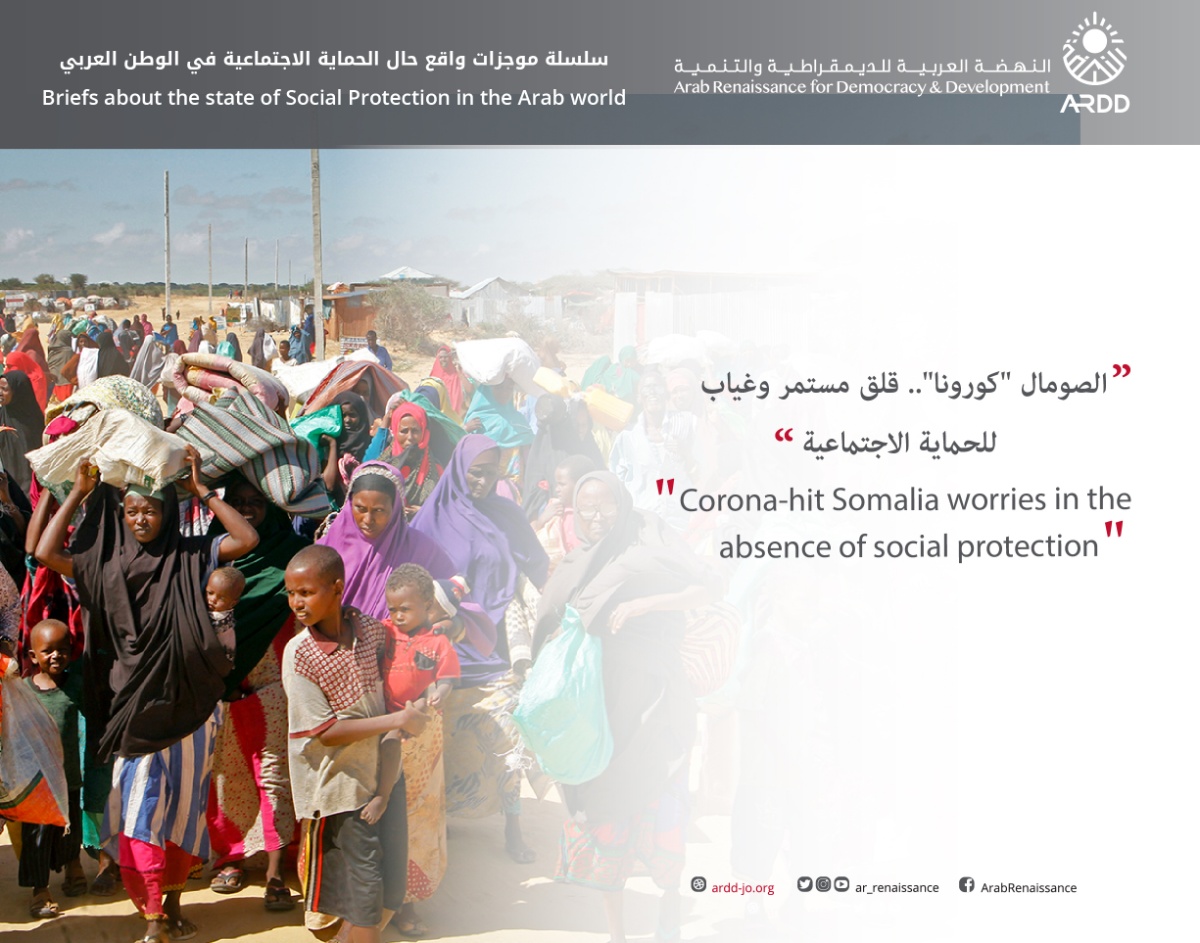Worry pervades Somalia due to the spread of the new coronavirus, as the country lacks the rule of law, central government control and medical care infrastructure, while witnessing growing poverty rates.
The situation in this country, in the Arab world, in general, prompted the Arab Renaissance for Democracy and Development (ARDD) produce a series of briefs about the state of social protection in this part of the world. In this case, it is documenting Somalia’s response to and the procedures it took to fight the corona pandemic.
ARDD has been researching Arab states’ efforts to fight poverty and provide social protection To their population; essential to this research have been the responses of the Arab states, civil society and humanitarian organizations and youth initiatives to support the most vulnerable groups.
In this brief, ARDD documents the measures taken by the Federal Republic of Somalia to cater to the needs of the most vulnerable groups such as refugees, day laborers, women, children and the elderly. ARDD urges Arab governments to set up emergency response plans that could help protect their people from the ramifications of the virus.
The World Food Programme (WFP) warned against the outcome of the challenging situation Somalia finds itself in, particularly since the first coronavirus case was documented on 16 March. It warned that the corona crisis could worsens the country’s fragile food security state, particularly in view of the fact that efforts to develop households’ capacity to survive without WFP services have backpedalled.
In Somalia, around 1.3 million people suffer from serious food insecurity [1]. Now that most of the trade sector activities and domestic transport have been interrupted, fears grow about a looming food crisis and worsening of the living conditions .
Unlike most of its neighboring countries, Somalia’s central government has little control over big parts of the country, which puts the country in a continuous state of military conflict. Some groups control most of the rural areas already living in poverty and hunger, which makes people even more vulnerable to the spread of the virus.
Somalia has 2.6 million internally displaced citizens with limited or non-existing access to health services[2]. It ranked 194, out of 195 countries, in health security and some of its areas scored zero in the disease preparedness indicators.
Thousands of internally displaced people in Sayidka camp fear corona which, if it spreads, could turn their lives into living nightmares. The camp lacks ventilators, and has a fragile infrastructure and a deteriorating health care system, with people lacking access to medical care and unable to afford taking preventive measures[3].
According to Human Rights Watch, Somalia, along with Indonesia, Ghana and Nigeria, and faced with the wide spread of the coronavirus, has recorded cases of abuse of and lack of health care for children and people with disabilities.
These vulnerable groups that live in great distress have increased episodes of depression and panic attacks due to the spread of the pandemic. This makes it incumbent on the Somali government to provide them with social and health care programs, and proper education.
The elderly, who already have health problems, lack proper social protection and health care, and live in difficult conditions. If infected with the virus, they are prone to having severe symptoms, such as pneumonia[4].
Not only does Somalia lack ventilators for the severely sick with corona, it is also short of testing kits. All tests are sent to other countries and results arrive a week later, which contributes to increasing the number of Covid-19 cases[5].
The Somali government took some preventive measures to control the spread of corona; for example, it cancelled all domestic and international flights, excluding the ones delivering humanitarian aid and basic food items, suspended schools and universities, and called on reducing unnecessary social gatherings[6].
As part of its preventive measures, the Somali government released 148 prisoners who do not have criminal records, providing them with the required health care in collaboration with the Ministry of Health[7].
As for youth initiatives to limit the risks of corona, university students launched initiatives raising awareness in heavily populated areas. One of the initiatives, “An ounce of prevention is worth a pound of cure”, works on spreading social awareness, especially amid the deteriorating health situation in the country[8].
Somalia is going through a serious humanitarian and health crisis, with little to non-existent Arab and international support. In the absence of plans and local human and financial capacities, it is essential to support the government, the civil society and the private sector.
[2] Somalia Documents 21 Covid-19 Cases and Its First Death
[3]Corona is Yet Another Tragedy Added to The Lives of Somali Refugees
[4] Protect the rights of people with disabilities during the Corona virus outbreak
[5]The Ghost of Corona Increases the Suffering of Somalis
[6]Corona in Somalia… Fears of Another Cholera Nightmare
[7]The Preventive Measures in Somalia
[8]Somalia Releases 148 Prisoners to Control the Spread of Corona
[9]An ounce of prevention is worth a pound of cure… A Somali Initiative to Fight Corona


